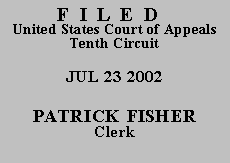

| DAVID ANDREW WOODRUFF;
GARY RICHARDS; AURELIO
MORIEL; C. C. JANSEN;
C. NEWTON; JASON ST. CLAIR; MARK E. MCGINN; IKE MARES; MITCH OROSCO; KURSTON ROBERTS; MELVIN SLATON; LEVI COLLEN; J. SEVERSON; PAUL H. GIFFORD; JOHN RODERICK; RANDY SCHRUDER; CODY TERRY; DON DAVIS ,and ANDY SENA; JAMES R. STURMAN; GARY GENE CAPSHAW; PAUL D. HOLMES; BOBBY LEE DOLENCE; ROBERT F. GOKEY; A. WALLACE; BILLY JONES; CHAD FUNDAREK; STEVEN MITCHELL; MIKE VAN GORP; DALE HARPER; T. IKENBERRY; W. LINDLY; J. MARSHALL; ROBERT J. CLEARWATER; JOHN JENKINS; CHRIS L. SMITH; RONALD LEROY KENNEDY; ROD BLAKEMAN; RON DURHAM, Petitioners,
v.
VANCE EVERETT, Warden,
Wyoming Department |
No. 01-8087
(D.C. No. 01-CV-151-D) (Wyoming) |
Plaintiffs' complaint arises out of alleged conditions at the Wyoming Prison stemming from a lock-down of prisoners beginning on June 20, 2001. As a result of the lock-down, plaintiffs claim they were denied access to the dining hall, gym, outdoor athletic field, and library, and were prevented from engaging in various activities, all in violation of their constitutional rights. Plaintiffs filed the present section 2254 petition in federal district court in October 2001. In a brief order, the district court dismissed the petition. The court distinguished section 2254 petitions from section 1983 claims, quoting Green v. Suthers, 200 WL 309268, at **1 (10th Cir. Mar. 27, 2000). Order at 2. The court denied plaintiffs' request for a certificate of appealability.
To determine whether plaintiffs are entitled to a certificate of appealability when the district court has denied a habeas petition on procedural grounds, we examine whether they have shown "that jurists of reason would find it debatable whether the petition states a valid claim of the denial of a constitutional right, and that jurists of reason would find it debatable whether the district court was correct in its procedural ruling." Slack v. McDaniel, 529 U.S. 473, 478 (2000) (construing 28 U.S.C. § 2253(c)).
While we recognize that it is not always easy to determine whether to bring a section 2254 habeas petition or a section 1983 civil rights claim, caselaw makes the distinction in the case before us fairly simple. Challenges to the fact of conviction or confinement or the duration of confinement are cognizable only under the habeas statutes, see Heck v. Humphrey, 512 U.S. 477, 481 (1994) (citing Preiser v. Rodriguez, 411 U.S. 475, 488-90 (1973)), while section 1983 actions are typically the proper vehicle for attacking unconstitutional conditions of confinement and parole procedures. See Preiser, 411 U.S. at 498-99; Rhodes v. Hannigan, 12 F.3d 989, 991 (10th Cir. 1993); Richards v. Bellmon, 941 F.2d 1015, 1018 (10th Cir. 1991). Because plaintiffs' petition unquestionably seeks to challenge conditions of confinement, it must be brought as a section 1983 action. Plaintiffs' motion to this court for a certificate of appealability presents no reasons why, as the law currently stands, their action could be brought as a habeas petition. Their challenges to a well established body of caselaw relating to the use of habeas corpus petitions in challenging prison conditions are not persuasive. In short, nothing plaintiffs present on appeal convinces us "that jurists of reason would find it debatable whether the district court was correct in its procedural ruling." Slack, 529 U.S. at 478.
The district court dismissed plaintiffs' petition without prejudice, allowing them to re-file their complaint as a civil rights action. Because the Supreme Court has recently interpreted the Prison Litigation Reform Act (PLRA), 42 U.S.C. § 1997e(a), to require exhaustion of administrative remedies in all suits seeking redress for prison circumstances or occurrences, Porter v. Nussle, 534 U.S. 516 (2002), prior to re-filing plaintiffs must first exhaust all available administrative remedies.(2)
We GRANT plaintiffs' motion to proceed in forma pauperis, DENY their request for a certificate of appealability, and DISMISS the appeal.
ENTERED FOR THE COURT
Stephanie K. Seymour
Circuit Judge
*.After examining appellant's brief and the appellate record, this panel has determined unanimously that oral argument would not materially assist the determination of this appeal. See Fed. R. App. P. 34(a)(2) and 10th Cir. R. 34.1(G). The case is therefore submitted without oral argument. This order and judgment is not binding precedent, except under the doctrines of law of the case, res judicata, or collateral estoppel. The court generally disfavors the citation of orders and judgments; nevertheless, an order and judgment may be cited under the terms and conditions of 10th Cir. R. 36.3.
1. Petitioners have also filed a motion seeking to proceed in forma pauperis. That motion is granted.
2. We recognize that pro se pleadings are to be liberally construed. See Haines v. Kerner, 404 U.S. 519, 520-21 (1972)(per curiam). Under this standard plaintiffs' habeas petition could be construed as a civil rights complaint. Even if we were to do so, however, the action would still be subject to dismissal without prejudice under Porter for failure to exhaust administrative remedies.